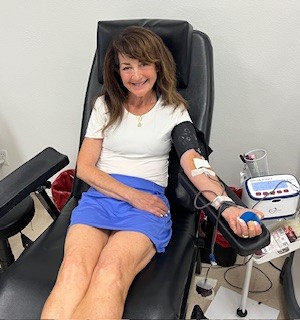
Perspectives on Diabetes Care
This is the official blog of the Association of Diabetes Care & Education Specialists where we share recent research and professional opinions on diabetes care and education.
Current & Past ADCES Blog Articles
Donating Blood: Guidelines for Our Clients with Diabetes
Oct 13, 2025, 13:46 PM
by Janice Baker, MBA, RDN, CDCES, CNSC, BC-ADM
 In stressful times when events in the world or even locally seem overwhelming and distressful, many of us try to find ways to contribute, process grief and find a sense of meaning. This “earthquake” moment happened to me a couple of years ago when I felt helpless in a situation that I can’t even recall now, but I felt the need to do something to contribute besides just doom scrolling and discussing the events of the day with family and friends. I decided to start donating blood on a regular basis. While a little scary at first (even with the veins that my phlebotomists love) the procedure and experience was quick, smooth and pleasant. Recovery was not an issue, however, to maintain my serum iron levels between donations, I take an iron supplement as discussed with my personal physician.
In stressful times when events in the world or even locally seem overwhelming and distressful, many of us try to find ways to contribute, process grief and find a sense of meaning. This “earthquake” moment happened to me a couple of years ago when I felt helpless in a situation that I can’t even recall now, but I felt the need to do something to contribute besides just doom scrolling and discussing the events of the day with family and friends. I decided to start donating blood on a regular basis. While a little scary at first (even with the veins that my phlebotomists love) the procedure and experience was quick, smooth and pleasant. Recovery was not an issue, however, to maintain my serum iron levels between donations, I take an iron supplement as discussed with my personal physician. Besides the warm message of gratitude from the San Diego Blood Bank, and some nice t shirts, the heartfelt messages of appreciation from friends and acquaintances have been priceless and touched me more than I anticipated. A friend who has had several transfusions during cancer treatment, another who had recent unexpected bleeding after heart surgery, and other incidents where blood transfusions were needed made me incredibly grateful that I could do something to make a difference for them and as many as 48 others so far according to the blood bank records. As I approach my 3-gallon mark, my blood type is also in demand for platelet donation, which can be used universally for neonatal ICU patients and cancer patients.
As I mention to friends and family, my blood donation days are a highlight of my life- one of the “glimmers” that we can add if we are able, to bring in a sense of meaning and purpose – an important factor in the wholistic definition of health.
For our clients with diabetes, the numerous burdens – physically, financially and psychologically- can promote of feelings of shame, stigma, guilt and poor sense of self-worth. Being able to contribute and show up for others in need is one way to support self-esteem and mental health. Of course, there are many ways to volunteer and donate time and efforts to meaningful causes (my late aunt who deal with severe complications of diabetes spent a lot of time in the hospital in the 1970s before she passed and volunteered for special projects during her hospital stays. The hospital wrote up a special article in the local newspaper about her contributions which I wish I still had).
For our clients with diabetes may be or are interested in donating blood, some guidelines to consider include:
- Contact your local blood bank and ask about blood donor requirements. Per www.redcrossblood.org, people with prediabetes and diabetes are generally eligible to donate blook if they are feeling well and their diabetes is well managed.
- People with diabetes who use medications for glucose management should be able to donate blood in most circumstances. Discuss your blood donation plans with your personal physician for specific recommendations.
- As with all who donate blood, as I am reminded before each donation, eating a healthful, balanced meal, drinking extra fluids, and getting a good night’s sleep are important habits.
- Those with diabetes should monitor their blood sugar levels prior to and after donating blood.
- Continue to consume fluids and regular meals and snacks along with rest as needed.
- If you donate frequently, discuss taking multivitamins with iron with your doctor to ensure you continue to replenish your iron stores before your next donation. Some people with or without diabetes may have excess iron stores in their blood and should avoid supplemental iron.
- Follow directions. From blood donation site staff on bandaging, activity level recommendations and contact information for any questions after donation.
- Tell others about your good deed! The gratification of giving blood is a feeling you’ll want to share.